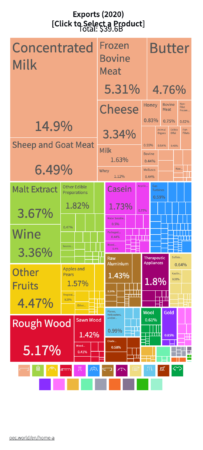- Ancient DNA maps ‘dawn of farming’. Hunter-gatherers from Europe and the Middle East mixed and settled down as farmers in Anatolia, then spread to Europe.
- The Australian dingo is an early offshoot of modern breed dogs. The dingo originated from grey wolves, and found itself isolated, much earlier than all other dog breeds.
- The first use of olives in Africa around 100,000 years ago. Hunter-gatherers used the wild olive long before they domesticated either it or the dog.
- Intestinal parasites in the Neolithic population who built Stonehenge (Durrington Walls, 2500 BCE). Neolithic people and their dogs ate the same things.
- Comparative seed longevity under genebank storage and artificial ageing: a case study in heteromorphic wheat wild relatives. Seeds of the same crop wild relatives species but with different shapes have different seed longevities.
- Stepping up to the thermogradient plate: a data framework for predicting seed germination under climate change. But do heteromorphic seeds have different germination requirements too? Here’s how to find out.
- Conservation interventions can benefit species impacted by climate change. Biodiversity was helped with the effects of climate change in 30% of cases, especially if interventions were targeted on specific species. Genebanks available for comment.
- Urban conservation gardening in the decade of restoration. Speaking of interventions…
- South and/or north: an indigenous seed movement in South Korea and the multiple bases of food sovereignty. Wait, what about the genebank though?
- Perspectives in machine learning for wildlife conservation. Surely if you can use fancy tech and maths to monitor cheetahs, monitoring crop wild relative populations and landraces should be a doddle.
- Quantifying an online wildlife trade using a web crawler. Surely if you can crawl the web for evidence of illicit wildlife trade, crawling it to evidence of genetic erosion of crop diversity should be a doddle.
- Plant beta-diversity across biomes captured by imaging spectroscopy. How about capturing beta-diversity within crop fields, though? A doddle, no? We’ve come a long way since those first Anatolian farmers and their dingoes.
Trade and germplasm
Want to know why New Zealand has a huge collection of temperate forage diversity in its Margot Forde Forage Germplasm Centre, part of AgResearch Ltd? Just check out its exports on the OEC website.
I learned about the OEC’s snazzy visualisations of economic data via their addictive daily game Tradle, which invites you to guess the country based on its exports.
I think we should do a version where you guess the country based on its genebank holdings, but that’s another story.
Nibbles: Brazilian national genebank, Seed saving network, Botanic garden
- Embrapa genebanks hard at work saving seeds in Brazil.
- Ujamaa Cooperative Farming Alliance hard at work saving seeds in the USA.
- Naples Botanical Gardens hard at work saving seeds in Florida.
- Really does take all sorts…
Nibbles: Access to seeds indeces, Rare plants genebank, Maize and climate change, Bogota market
- So there’s an African Seed Access Index whose relationship with the Access to Seeds Index is unclear.
- The Pacific Northwest has a genebank called the Miller Seed Vault whose relationship with the National Laboratory for Genetic Resources Preservation in Fort Collins, Colorado is quite clear.
- The relationship between climate change and changes in crop distributions is becoming clearer, and more worrying.
- What is the relationship between huge markets such as Samper Mendoza in Bogota and plant conservation?
Brainfood: Trade double, Organic farming, Food vs non-food, Wild plants, Wheat yields, CWR in S Africa, Gene editing, European seed law, Farm diversity
- Agricultural trade and its impacts on cropland use and the global loss of species habitat. Rich countries have a large biodiversity footprint outside their borders because they import a lot of agricultural products from areas where biodiversity is disappearing fast.
- International food trade benefits biodiversity and food security in low-income countries. Ah, but low-income, high biodiversity countries import a lot too. I really don’t know what to think about trade now. Nicely parsed by Emma Bryce.
- Biodiversity and yield trade-offs for organic farming. Biodiversity gain and yield loss balance each other out. Oh, come on scientists, would it kill you to give a definite answer?
- Crop harvests for direct food use insufficient to meet the UN’s food security goal. We should definitely use more cropland for actual human food. But that would probably not be good for exports, no? Uff.
- The hidden safety net: wild and semi-wild plant consumption and dietary diversity among women farmers in Southwestern Burkina Faso. Yeah, but who needs crops and imports anyway.
- Six decades of warming and drought in the world’s top wheat-producing countries offset the benefits of rising CO2 to yield. In any case, crops are in trouble.
- Planning complementary conservation of crop wild relative diversity in southern Africa. But CWR will save crops if only we can conserve them.
- Genome Editing for Sustainable Agriculture in Africa. Especially if we use the latest toys.
- Impact of the European Union’s Seed Legislation and Intellectual Property Rights on Crop Diversity. And have all the right policies in place.
- Farm-level production diversity and child and adolescent nutrition in rural sub-Saharan Africa: a multicountry, longitudinal study. But actually, it’s livestock we really need.
